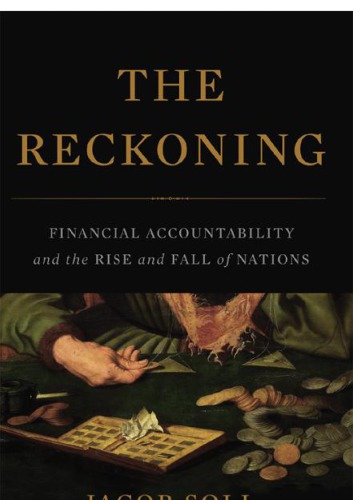
The Reckoning
Financial Accountability and the Rise and Fall of Nations
- اطلاعات
- نقد و بررسی
- دیدگاه کاربران
نقد و بررسی

March 3, 2014
Good bookkeeping makes for good government—but not for very long—according to this absorbing history of accounting in the public sphere. Historian and MacArthur fellow Soll (The Information Master) surveys public financial record keeping after the invention of double-entry accounting in 13th-century Tuscany, a breakthrough that made systematic analysis of profit and loss possible. The benefits for well-ordered, responsible government were felt wherever this innovation was embraced: medieval Italian city-states, 17th-century Holland, and 18th-century Britain all became economic and geopolitical powerhouses, he argues, thanks to well-kept government books. But his is even more a story of backsliding and failure, as corruption, spendthrift government, and factional intrigues perennially undermine the discipline of meticulous public accounting—and the state. Soll’s engaging narrative highlights both the political impact of accounting practices—a public audit of Louis XVI’s woeful state finances helped spark the French Revolution—and the advent of a “culture of accountability” as the bourgeois business classes rose to power; he explores the deep-seated religious and philosophical power of balanced-books metaphors in the West, from the Gospel of Matthew to Thoreau’s championing of the simple life. The result is a provocative, illuminating take on history that assigns humdrum accountants a central and dramatic role. Photos.

March 15, 2014
Soll's (History/Univ. of Southern California; The Information Master: Jean-Baptiste Colbert's Secret State Intelligence System, 2009, etc.) double-entry bookkeeping in relation to the political and cultural significance of accounting and the rise and fall of nations and businesses. In his historical analysis, the author examines why modern societies consistently find themselves mired in crises involving not only financial issues, but political accountability as well. Different than entries in a checking account register, double-entry bookkeeping tracks credits and debits in separate columns, thus permitting real-time accounting of the costs and profits associated with particular and aggregated transactions. The author argues that it allows effective management through accountability and auditing. He contends that successful nations have not only been rich in accounting and commercial culture, but have also learned how to build cultural frameworks that have countered the all-too-human tendency to ignore, deceive or falsify. Soll substantiates his thesis by tracing the history of the method from its beginnings, showing how it was used successfully, and then disregarded disastrously, by Florence's de Medici family and, later, France's Louis XVI. The author credits Luca Pacioli's 1494 Treatise as the enduring source that permitted the technique to be adapted for public policy, beginning with the Dutch republic. Some of the founders of the United States, including Robert Morris and Alexander Hamilton, also used the method. Soll stresses the cultural benefits of incorporating accounting into educational curricula during the 19th century, and he explores how standards have been lowered over time, starting with railroad barons' failures to adequately pay to replace aging equipment and ending with the current concept of mark-to-market, in which financial assets are worth what others will pay for them. An intriguing, well-crafted discussion highlighting a major contribution to political and economic well-being, with an obvious moral for today.
COPYRIGHT(2014) Kirkus Reviews, ALL RIGHTS RESERVED.




دیدگاه کاربران